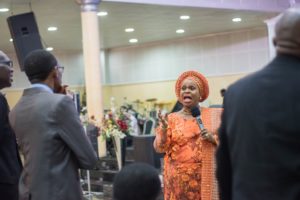The Man in the Back of the Room – And Other Issues Facing Women Preachers
Author: Jodi DetrickMy heart beat a little faster. I noticed the unfamiliar man who had just walked into the banquet room and leaned against the back wall. He did not appear to be restaurant staff. I wondered what he was doing in this setting. Suppressing my uneasiness I continued addressing the women gathered at a downtown eatery for a Christian businesswomen’s luncheon. I was still young (in my mid-twenties). It was an honor to speak at an event like this — actually any event, especially in that early season of life and ministry. I did not want to get flustered and not adequately deliver what God had put on my heart.

As I continued with my message, the man stood, arms crossed, glaring at me. When he began to walk forward, I wondered what would happen next. Soon he was standing in front of me. He picked up my Bible lying on the podium beside my notes, thumbed through the pages, pointed at a passage, and said in commanding tones, “Read this.” He walked out of the room and onto the busy street.
This episode seemed surreal as I glanced to where the man had just pointed — 1 Timothy 2:11,12: “A woman should learn in quietness and full submission. I do not permit a woman to teach or to assume authority over a man; she must be quiet.” Though unnerved, I somehow managed to get through my talk. I never learned who the man was, where he came from, or what prompted him to walk, uninvited, into this meeting for Christian professional women and their guests. I did know one thing about him with certainty; he thought I was disobeying God by speaking publicly, even to a group of women. And he felt it was his job to put me in my place.
That was not the first or last encounter I would have with those who believe there is no biblical basis for women in public ministry (especially preaching or teaching) or in church leadership. But it was one of the most personal and jarring things I experienced in my early years related to that issue. No wonder many young women, facing similar incidents of opposition and criticism, have lost heart when it comes to fulfilling the call to a preaching ministry, especially if the doors of opportunity to do so seem few and far between.
I will be honest. Preaching to a mixed-gender audience has been intimidating for me at times. On occasion, the disapproving countenance or dismissive body language of some has caused me self-doubt. There is, I am certain, a correlation between these experiences (including that unsettling man in the back of the room incident) and my times of hesitancy when it came to public ministry where men were present.
To be fair, I have met plenty of women with the same “no female preachers” view who can be just as intimidating as any man with that perspective. And I have also had nonintimidating, mutually respectful encounters with those of both genders who happen to see this issue differently. We can and should have healthy, thought-provoking exchanges with those whose beliefs on this topic contrast our own without either party feeling belittled.
Thankfully, I married a man who believes God calls women both to preach and to lead. Don also believes in me and constantly encourages me to move forward confidently in my calling and leadership. With his support and a sense of divine direction, I “found my voice” as the only female on an otherwise all-male district leadership team for almost 9 years. Serving with that great team at the Northwest Ministry Network (NWMN), who also support the call of women to ministry, was a high privilege and has reaffirmed my belief that the body of Christ functions best when God’s image is fully represented by both genders.
During that season the district invited me to do a short Communion message for the ministers gathered at our annual conference (district council). Speaking to ministry peers can be scary for any of us but, by God’s grace and with His help, it was a sweet experience. I felt my heart swell with gratitude as I looked into the faces of my brothers and sisters who reflected back nothing but encouragement and affirmation. In some odd way, that day I felt like I had completely faced down my old fear of the disapproving man in the back of the room.
ISSUES WOMEN PREACHERS FACE
 Most female preachers face issues their male colleagues also encounter: discerning and answering God’s call, adequate spiritual formation, proper education and training, knowing how to faithfully exegete the Scripture, personal integrity (living the message), prioritizing time for sermon preparation, developing a good delivery, knowing one’s listeners, and above all, having the Holy Spirit’s anointing. Some issues, however, are unique to women who preach.
Most female preachers face issues their male colleagues also encounter: discerning and answering God’s call, adequate spiritual formation, proper education and training, knowing how to faithfully exegete the Scripture, personal integrity (living the message), prioritizing time for sermon preparation, developing a good delivery, knowing one’s listeners, and above all, having the Holy Spirit’s anointing. Some issues, however, are unique to women who preach.
While the man in the back of the room was my hurdle to overcome, overt censure based on gender bias is only one of the potential obstacles facing women whom God has called to preach to the whole church. Since most of these problems are of less concern when women are speaking strictly to other women (an equally important, invaluable expression of ministry), I will focus primarily on three issues having to do with mixed-gender settings. And while these are among the most prevalent challenges I have observed and heard about from female colleagues (and/or experienced personally), this is not a definitive list — especially for women who are lead pastors or teaching pastors. But these three concerns are a good place to begin when we look at issues female preachers face.
Fewer opportunities. If practice makes perfect, then a real where-the-rubber-meets-the-road issue is that female ministers often have fewer opportunities to preach than their male counterparts. This can equate to greater inexperience (especially in mixed-gender settings) and fewer occasions to fully develop their preaching skills. Obviously, we cannot manufacture by any amount of rehearsal or repetition God’s anointing and the proclamation gifts He gives. Still, humans are hard-wired, by divine design, to hone their gifts through experience and practice. The more we do something the better we get at it.
In 1 Timothy 4:14–16, Paul tells us not to neglect the ministry gifts God has given us, but to cultivate them. Women whom God has called to preach must be prayerfully proactive about developing this ministry skill and watch for God-opened doors to proclaim His truths. I am not sure God sees our preaching opportunities as large and small — big gatherings versus just a few hungry hearts, mixed groups or women-only gatherings; it all counts. Every assignment to deliver His Word is precious and not to be taken lightly. But I do believe He uses all our accumulated obedience, investment in training, and various ministry experiences to prepare us for greater assignments. Thomas Kingsley’s words apply here: “Have thy tools ready; God will give thee work.”
With that said, I hope those in authority prayerfully consider called women when extending an invitation to preach. Those who do will not only be exposing hearers to a broader representation of the voices God uses to speak to a world of great need (and great variety), they will be giving a colleague opportunity to express, and further develop, God’s call on her life.
The freight of being first. This issue follows the previous one. In recent years, I have been humbled and blessed by invitations to preach on Sunday mornings for various churches. At times people tell me (or perhaps, forewarn me), “You are the first woman to ever preach in this church on a Sunday morning — at least as long as anyone around here can remember.”
While this is a great honor, the unspoken message I, and other women who are “firsts,” may hear is, And you could be the last if you mess up. You had better knock it out of the park for the sake of other women who follow. No pressure.
I am sure that is not the intention behind a “you are the first” declaration by ministry hosts, usually male pastors. Most are expressing honor and are truly glad to have a female ministering in their pulpits. Still, if we knew the truth, to even extend this invitation, someone bravely bucked local culture and risked the displeasure of congregants who do not believe it is biblically valid for women to do pulpit ministry. All this leads to an unexpressed, but very real, added weight on a female preacher to do an especially good job because she is essentially representing all her sisters in ministry. This is not usually the case with male ministers.
We all have hits and misses when it comes to delivering power-packed, compelling sermons. When a man’s message is not quite up to par, it does not mean no other man should be given the opportunity to preach again in that setting. And while women (and men) should continually strive to offer God and others our best when we preach, it would be nice to know we would not necessarily be killing all future ministry opportunities for females in that setting if we do not knock it out of the park every time.
Most female preachers I know are courageous women who would not be excessively intimidated by the pressure of being a first. In fact, they might enjoy the challenge and appreciate the opportunity even more. Count me in that number. However, it is healthiest when we offer to each other, and to ourselves, the latitude to do our best every time we preach without this undue burden. When someone says, “You are the first woman to preach in this pulpit,” what I would love to hear next is, “but our intention is that you will not be the last.”

An insufficient theological foundation. I have encountered a number of women who have a burning sense of God’s call and a passion to proclaim the Word. Yet, they still struggle with whether or not it is biblical for females to preach. Books and articles, or some loud voices declaring otherwise, have discouraged them. And most grew up with very few (or no) role models of women who preached regularly in their local church.
A familiar truism claims knowledge is power. Biblical knowledge and good historical perspective provide women the power and courage to pursue ministry, including the call to preach, to its fullest scope.
This is not the militant kind of power leading to ill will and endless arguments with those who see things differently, but rather, a gentle strength that springs from knowing who we are as women called of God. Having a firm biblical base provides a foundation that can withstand gender bias, even antagonism, and still be a winsome witness that God calls and uses both men and women.
Many excellent books carefully examine the Scriptures and offer solid reasons for believing God’s call to preach extends to women. Among them, God’s Women: Then and Now by Deborah Gill and Barbara Cavaness is outstanding. Anyone still ambivalent on the subject would be wise to carefully, prayerfully read this book, and others like it.
While I freely admit there are a few difficult texts on this subject (like the 1 Timothy verses the man in the back of the room pointed to that day), it is important to consider the concepts of context, content, and categories when reading and applying Scripture. Gill addresses these issues with insight: “Finding the meaning of a text is the reader’s goal. God’s Word has eternal relevance and also historical particularity. Bible texts can be divided into several categories: 1) highest norms or standards (timeless truths), 2) regulations for people where they were, and 3) records of history. All the Bible is ‘God-breathed and is useful for teaching, rebuking, correcting and training in righteousness’ (2 Timothy 3:16,17). Yet, not all passages apply equally to every situation.”1\

Careful study of the Bible with these things in mind point to the truth that, while there are verses dealing with exceptional situations that on the surface may seem to limit the roles of women (most notably 1 Corinthians 14:34,35 and 1 Timothy 2:11,12), the whole of Scripture endorses the ministry and leadership of women. If this were not the case, the Bible would most certainly be contradicting itself in multiple instances.
Many “timeless truth” verses call for women to serve God in leadership and ministry. Among the most noteworthy are those in Acts 2, especially in the light of Acts 1:4–8 and Joel 2:28. In these verses, God fulfilled His promise to pour out His Spirit on all flesh (including women), as was His proclamation that both sons and daughters would prophesy. Galatians 3:28, which says that in Christ there is neither male nor female, is another important “timeless truth” on this issue.
Then there is the matter of the historical records in Scripture. God used a woman, Deborah, as a judge (the highest position of leadership in Israel at that time) and prophet. She spoke for God, presided over the affairs of men, and even led an army of men into battle. It is apparent that God honored her leadership and used her to deliver her nation from destruction. Miriam was a prophet and one of the leaders of her people during the exodus. Huldah, too, was an Old Testament prophet whom God used to turn Israel from paganism and idolatry back to true worship.
The New Testament has many examples of women who were leaders and ministers. Phoebe was a deacon and a trusted letter carrier of the Epistle of Romans for the apostle Paul. Junias was a female apostle. Philip the evangelist had four virgin daughters who prophesied. Priscilla was a pastor of a house church along with her husband, Aquila. Of the two, it is likely she was the most prominent leader, denoted by the fact biblical writers mention her name first more often in the texts. She traveled with Paul and, along with her husband, was an instructor and mentor for the gifted orator, Apollos. Some scholars believe she even authored the Book of Hebrews.
The historical record of the Bible is clear; many women were leaders and active as ministers. And in none of these cases do the Scriptures ever suggest God disapproved of them doing so. The Bible upholds them as examples and heroes of the faith.
Perhaps it is the treatment of women by Jesus that is the weightiest of arguments for their value to God as His servants in leadership and ministry. Jesus healed and taught them. He had important conversations with them (His talk with the woman at the well was the longest private conversation with an individual recorded in Scripture.) He never spoke down to them but revealed important theological truths to women. He included them in His traveling ministry and allowed them to contribute meaningfully to it with both their means and their presence. He always treated them with respect and courtesy. He defended them. He forgave their sins and delivered them from demonic attack. He was careful to use both genders as examples in His teachings and parables. He made His first entry to earth inside a woman and revealed His entry from death to a woman first, sending her to tell the men this good news.
Since Jesus is God, we can assume that He completely represents the heart and intentions of God toward women. That being the case, women can move forward with confidence to fulfill their calling to ministry and leadership knowing that Jesus expects no less of them and is cheering them on. He truly is the Champion of women.
For me, the old man in the back of the room is gone and a new one has replaced him. He is one of my many brothers in Christ who believes in me and cheers me on. Mostly though, instead of the old scowl of disapproval, I see the face of my Hero, Jesus. He smiles His encouragement and mouths, Go for it, daughter — I am with you. I made you for this.
